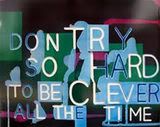Every now and again I'll come across a book which moves me to tears. I think this has happened maybe 3 or 4 times in my life. I recently finished Rebecca Solnit's "Hope in the Dark: Untold Histories, Wild Possibilities" and such a moment occurred in the very last chapter.
Rebecca Solnit is a local Bay Area activist and cultural historian. I first came across her in the Guardian's Comment is Free section, enchanted by her ballsiness in writing this entry. Her prose in "Hope in the Dark" shines and dazzles, waxing poetic on subjects that tend not to inspire great nonfiction writers to step outside of basic documentarian posturing.
The book revisits social movements stemming from the '99 WTO protests in Seattle, and traces some truly inspiring moments of activism which, in Solnit's view, have sparked a new breed of political activism across the globe, the Zapatistas in Chiapas often cited as one example of this new model. What's truly stunning is how she manages to connect all the dots, pinpointing the amount of political cross-pollination that has occurred over the past decade through common enemies such as war, global warming, environmental sustainability and labor rights. Linking conservative ranchers to lefty environmentalists fighting for sustainability; Kazakhs and Western Shoshones united against nuclear test sites, Solnit captures the seemingly nebulous state of modern social movements.
The ending of this book was so beautiful, and made me oh so very proud to be a San Franciscan:
 The future is dark, but begin in the present, at the Pacific where it fronts my city, where western civilization comes to an end in a strip of sand and the realm of whales and sharks begins. Fish populations are plummeting in this and other oceans, but if you go down the coast a ways you'll come to where the sea otters hunted nearly into extinction have come back to the kelp beds; if you go either north or south, you'll come to the beaches where the elephant seals who were likewise nearly exterminated return every winter to fight, mate, and nurse their young. Take a third Pacific species, though--the brown pelican, which also nearly disappeared, then came back--and imagine one pelican's trajectory from Ocean Beach, the western edge of my city and our continent.
The future is dark, but begin in the present, at the Pacific where it fronts my city, where western civilization comes to an end in a strip of sand and the realm of whales and sharks begins. Fish populations are plummeting in this and other oceans, but if you go down the coast a ways you'll come to where the sea otters hunted nearly into extinction have come back to the kelp beds; if you go either north or south, you'll come to the beaches where the elephant seals who were likewise nearly exterminated return every winter to fight, mate, and nurse their young. Take a third Pacific species, though--the brown pelican, which also nearly disappeared, then came back--and imagine one pelican's trajectory from Ocean Beach, the western edge of my city and our continent. Imagine it soaring with the heavy prehistoric grace of a pterodactyl down Fulton Street, the long street that starts at the beach, parallels the north side of Golden Gate Park, and carries on after the park ends to run east through the old African-American neighborhood, past surviving gospel churches and extinct barbershops to the little formal garden between the War Memorial Building and the Opera House, then straight into City Hall, whose great gilded dome straddles the street. Let that pelican soar through the echoing central atrium where in 1961 students who protested the anticommunist purges were washed down the marble stairs with fire hoses, let the bird float out the other side, going on east, to United Nations Plaza, where Fulton dead-ends into Market Street, the city's main artery. This is the place where stories come together, one of the countless centers of the world.
...From the west, California as a fierce goddess confronts you; at her feet stands the California grizzly, extinct everywhere but in art and on the state flag. Dedicated on Thanksgiving 1894, the monument survived the 1906 earthquake while all the buildings around it crumbled and burned...a few Native Americans denounced one of its life-size sculptural groupings, the one that shows a Mexican vaquero and padre looming ominously over a prone and apparently conquered Indian. They didn't succeed...but they stirred up a furious public conversation about California history, and they won an addition, a bronze plaque below the sculptural group that speaks of genocide and colonialism, a small rewriting of history, a small measure of change.
...This is what the world looks like to me, like U.N. Plaza, full of half-forgotten victories and new catastrophes, of farmers and junkies, of mountains of apples and of people trying to change the world and tell the truth. Someday all of this may be ruins, but for now it is a place where history is still unfolding. Today is also the day of creation.
We need more books like this to read in conjunction with bleak morning newspapers. We need something.




No comments:
Post a Comment